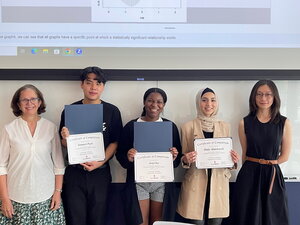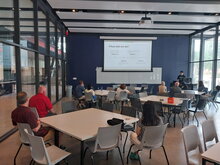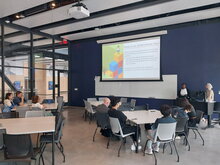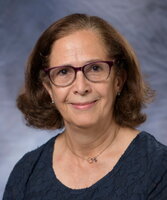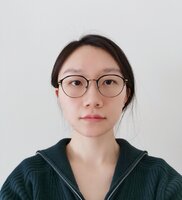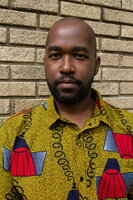The third annual Blackwell Summer Scholars Program concluded on June 29th, 2023, with the scholars presenting their research projects. This 6-week summer program was planned and put together by the Department of Statistic’s Diversity, Equity, and Inclusivity committee. It was also named in honor of University of Illinois Mathematics alumnus, David H. Blackwell. Created with the purpose of increasing access and equity for graduates in statistics, data science, and mathematics, this year, four scholars were invited to continue the Blackwell legacy.
The scholars are Ariel Ivy, Samuel Park, Hala Abdelrazek, and Tanaiya Sumter. At the start of the program, the scholars were immediately paired with their mentors. Ariel Ivy and Hala Abdelrazek were paired with their mentor Professor Zhang. Samuel Park and Tanaiya Sumter were paired with their mentor Professor Bravo. Throughout the program, they would also attend multiple seminars that encouraged and engaged them in creativity, coding, and statistics.
To begin, Samuel Park and Tanaiya Sumter presented their research on causal inferences in earth sciences. They analyzed readily available earth science datasets, driver and response variables, and imported this data into R. They also implemented statistical techniques such as Convergent Cross Mapping and an Empirical Dynamic Model (EDM) to find causal relationships between macroclimatic conditions for their data. As a result, their drivers helped them discover that only North Atlanta Oscillation Index (NAO), Atlantic multidecadal oscillation Index (AMO), and Pacific Decadal Oscillation Index (PDO), causes SPEI (their drought index).
Samuel expressed, “I can’t believe that the program had finished. Throughout this experience, I gained more insight into research that utilizes data science methods. I’ve learned new methods, models, and statistical techniques, and learned how to apply them to my data. We also used the program R a lot for coding. Overall, I enjoyed my stay and being able to meet new professors and friends. As I mentioned before, this was my first research experience, and I feel like I’ve fulfilled my goals well. If anyone wants to gain new experience about data science with a flexible schedule, I think this program can be a good opportunity!”
Tanaiya said, “This was a great experience for me to be exposed to different perspectives and areas of research within the world of statistics. I had a wonderful time with my fellow peers. Moreover, everyone in the program was also very supportive and showed that they truly care about its students. Although using the program R was challenging for me, I feel like this program has overall helped me grow and has opened my eyes even more to the importance of math and statistics.”
To continue, Ariel Ivy and Hala Abdelrazek presented their research on achievement gaps in the US education system based on standardized math test scores for teenagers across the nation. They analyzed the PISA 2018 exam data and variables such as “question characteristics”, “time spent on questions”, and “number of actions on questions”. They also used the program R to create and compare graphs of student demographic groups to find achievement gaps shown by varying race and socioeconomic status. As a result, they concluded that there are more variables of test taking behaviors that affect students with lower socioeconomic status.
Hala expressed, “I enjoyed my experience, and am glad to have met so many interesting people along the way! My research topic helped me explore an area of study I am already passionate about and I was very happy with our presentation.”
Ariel said, “I really enjoyed the program and am very grateful for the opportunity to do meaningful research with such great people. I liked the range of topics we heard in the seminars and wish there was an even greater range. It was amazing to hear different areas or applications of statistics that I wasn’t yet familiar with.” Additionally, Ariel added, “with the SCOTUS decision on affirmative action, it is important now more than ever to understand why different demographic groups are struggling and where our education system may be failing these students. Knowing what variables contribute to achievement gaps and where there may be bias is crucial to improving education for everyone.”
Gianna Pham
2023-07-14
Gianna Pham is a staff writer for the Department of Statistics. If you have news to share, please contact the Statistics news group at stat-office@illinois.edu.
